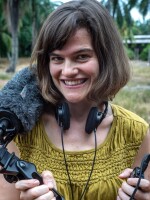A few months ago, we told you about a Peace Corps initiative that sends doctors and nurses abroad to teach and train local health workers — a sort of Peace Corps for Doctors.
They're not alone: Lots of health care professionals are now traveling abroad to help countries build better health care systems instead of simply giving on-the-spot medical care or dealing with emergencies.
"It's something that has really hit this incredible momentum in the last couple of years," Ambereen Sleemi, a Brooklyn urogynecologist with Maimonides Medical Center, tells Shots. "Everything before was very 'servicey.' That has changed to forming collaborations and partnerships."
We came across Sleemi on Twitter (@globalgyno) while she was traveling in Haiti. She's setting up a partnership there to train Haitian doctors in gynecology.

Sleemi is paying for the project with her own money, something she says many doctors who work abroad do.
"Very few trips get funded," she says. "Big programs can get money. But most little ones don't. Everybody is [doing it] out of pocket."
A few large and well-funded projects have sprung up in the past year, including a $15 million initiative in Rwanda headed up by former President Clinton.
The consortium, which includes top U.S. medical schools, like Harvard and Duke, plans to train thousands of doctors and nurses. But the project, set to last seven years, also aims to create medical schools that can keep the health care system going.
The Peace Corps collaboration, called the Global Health Service Corps, hopes to accomplish the same thing, but at a smaller scale, says its founder, Dr. Vanessa Kerry.
"Clinton's project is focusing on one country and one health system," she tells Shots. "We're doing a similar thing in three countries: Tanzania, Uganda and Malawi."
"We started taking applications last August, and we're just finalizing picks of the first 36 fellows," says Kerry, who also directs a global health program at Harvard Medical School.
About a quarter of the applicants were former Peace Corps volunteers and more than half were doctors and nurses in the late stages of the careers, which is ideal for training the trainers, Kerry says.
"We're talking about building leadership," Kerry says. "Somebody at the top of the pyramid — who is pluripotent and can do many things."
This will be first time the Peace Corps sends doctors and nurses abroad specifically to train health care workers, says Emily Dulcan, a spokeswoman from the Peace Corps.
"But early in Peace Corps history, there were times that we sent doctors and nurses to do medical work in the host countries," she tells Shots. "Now doctors and nurses apply to and serve the Peace Corps all the time, but what they are doing is not necessarily medically related."
The idea of training health care leaders abroad isn't new, of course. Many smaller nonprofits have been doing it for decades.
"We've been talking about it for 15 years," says Monika Bridgforth, a director at the nonprofit Physicians For Peace. "But now many of the big players are recognizing the importance."
Ten years ago, Physicians For Peace teamed up with George Washington University and the University of Santa Clara in Cuba to build a medical school in Eritrea.
Copyright 2021 NPR. To see more, visit https://www.npr.org.




